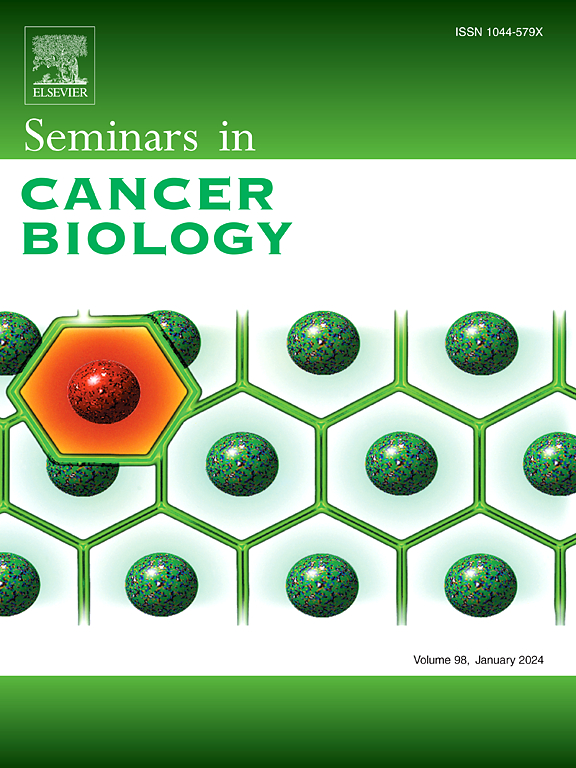From classical approaches to artificial intelligence, old and new tools for PDAC risk stratification and prediction
IF 12.1
1区 医学
Q1 ONCOLOGY
引用次数: 0
Abstract
Pancreatic ductal adenocarcinoma (PDAC) is recognized as one of the most lethal malignancies, characterized by late-stage diagnosis and limited therapeutic options. Risk stratification has traditionally been performed using epidemiological studies and genetic analyses, through which key risk factors, including smoking, diabetes, chronic pancreatitis, and inherited predispositions, have been identified. However, the multifactorial nature of PDAC has often been insufficiently addressed by these methods, leading to limited precision in individualized risk assessments. Advances in artificial intelligence (AI) have been proposed as a transformative approach, allowing the integration of diverse datasets—spanning genetic, clinical, lifestyle, and imaging data into dynamic models capable of uncovering novel interactions and risk profiles. In this review, the evolution of PDAC risk stratification is explored, with classical epidemiological frameworks compared to AI-driven methodologies. Genetic insights, including genome-wide association studies and polygenic risk scores, are discussed, alongside AI models such as machine learning, radiomics, and deep learning. Strengths and limitations of these approaches are evaluated, with challenges in clinical translation, such as data scarcity, model interpretability, and external validation, addressed. Finally, future directions are proposed for combining classical and AI-driven methodologies to develop scalable, personalized predictive tools for PDAC, with the goal of improving early detection and patient outcomes.
从经典方法到人工智能,PDAC风险分层和预测的新旧工具。
胰腺导管腺癌(PDAC)是公认的最致命的恶性肿瘤之一,其特点是晚期诊断和有限的治疗选择。传统上,风险分层是通过流行病学研究和遗传分析来进行的,通过这些研究可以确定关键的风险因素,包括吸烟、糖尿病、慢性胰腺炎和遗传易感性。然而,PDAC的多因素性质往往没有得到这些方法的充分解决,导致个体化风险评估的精确度有限。人工智能(AI)的进步被认为是一种变革性的方法,它允许将各种数据集(包括遗传、临床、生活方式和成像数据)整合到能够发现新的相互作用和风险概况的动态模型中。在这篇综述中,将经典流行病学框架与人工智能驱动的方法进行比较,探讨PDAC风险分层的演变。讨论了遗传见解,包括全基因组关联研究和多基因风险评分,以及机器学习、放射组学和深度学习等人工智能模型。评估了这些方法的优势和局限性,并解决了临床翻译中的挑战,如数据稀缺性、模型可解释性和外部验证。最后,提出了结合经典和人工智能驱动方法开发可扩展的个性化PDAC预测工具的未来方向,目标是改善早期发现和患者预后。
本文章由计算机程序翻译,如有差异,请以英文原文为准。
求助全文
约1分钟内获得全文
求助全文
来源期刊

Seminars in cancer biology
医学-肿瘤学
CiteScore
26.80
自引率
4.10%
发文量
347
审稿时长
15.1 weeks
期刊介绍:
Seminars in Cancer Biology (YSCBI) is a specialized review journal that focuses on the field of molecular oncology. Its primary objective is to keep scientists up-to-date with the latest developments in this field.
The journal adopts a thematic approach, dedicating each issue to an important topic of interest to cancer biologists. These topics cover a range of research areas, including the underlying genetic and molecular causes of cellular transformation and cancer, as well as the molecular basis of potential therapies.
To ensure the highest quality and expertise, every issue is supervised by a guest editor or editors who are internationally recognized experts in the respective field. Each issue features approximately eight to twelve authoritative invited reviews that cover various aspects of the chosen subject area.
The ultimate goal of each issue of YSCBI is to offer a cohesive, easily comprehensible, and engaging overview of the selected topic. The journal strives to provide scientists with a coordinated and lively examination of the latest developments in the field of molecular oncology.
 求助内容:
求助内容: 应助结果提醒方式:
应助结果提醒方式:


